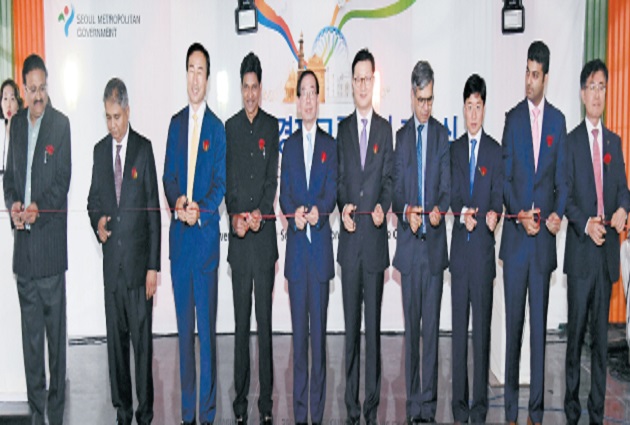
21 Mar Seoul encourages entry into Indian market
HARYANA, India – In a developed pocket of India’s Haryana State called Gurgaon, the Seoul city government and the Korea-India Business Center (KIBC) celebrated on Wednesday the opening of the Seoul-India Economic Exchange Center to boost the entry into the Indian market of Korean small and medium-sized businesses.
“Major companies in Korea, like Samsung, LG and Hyundai are doing very well here in the Indian market, which is referred to as the ‘next China,’” said Seoul Mayor Park Won-soon, addressing Korean and Indian business stakeholders at the center in Gurgaon.
“So I believe that now is the time for small and medium-sized enterprises and start-ups to have the same opportunity as well. I hope that the Seoul-India Economic Exchange Center will pave the way for start-ups in Korea to enter into the Indian market, which is also referred to as the ‘bright spot’ of the global market.”
“The center will be a place where young entrepreneurs from Korea can come and learn the Indian market to become regional experts by making use of the knowledge pool shared here by Korean companies that have long been doing businesses in India,” said Lee Yang-koo, CEO of the KIBC.
“We established the center and we will be running it, but we ask the city government for assistance in encouraging young entrepreneurs to venture into the Indian market.”
The Seoul Metropolitan Government and the KIBC signed an MOU last year when the KIBC brought some 140 business leaders from India to Seoul to explore the market.
“According to the Ministry of Trade, Industry and Energy in June last year, some 40,000 Korean companies had entered the Chinese market but only 400 had entered the Indian market,” Lee said.
“But in a media interview after his inauguration, President Moon Jae-in said that he will increase cooperation with India politically, economically and on security affairs to the level of that between Korea and the four regional powers – United States, China, Japan and Russia.
“This center will be the bridge between Gurgaon and Seoul, through which Seoul’s urbanization successes and fourth industrialization revolution technology can be shared,” Lee added. “It will be a parallel commitment by Seoul alongside the ongoing Korea-India cooperation to develop 100 smart cities in India.”
Korea agreed in 2015 to invest $10 billion in India’s infrastructure development, including the Narendra Modi government’s plan to create 100 smart cities. The commissioner of Gurgaon welcomed Seoul’s commitment, but warned that entering the Indian market is not always easy.
“There is a lot of talk that India is a difficult place to do business. We have to be patient to understand the market,” said D. Suresh, commissioner of Gurgaon. “Exciting possibilities are going to be available in India. India is going to be the largest market in 2025 and I believe that this center will play a very important role in enhancing cooperation between the two countries.”
Following the opening of the Seoul-India Economic Exchange Center, 10 Korean start-ups pitched their products to some 40 Indian business stakeholders in New Delhi on Thursday. They include the smart home device company Grib, the AI software company MediSapiens and the automobile company Edison Motors.
“We have smart home devices and smart-campus and smart-building technology that can be included in India’s smart-city project,” said Jung Yeon-kyu, CEO of Grib. “Through this meeting between Korean and Indian business stakeholders, my company was granted a valuable opportunity to showcase our products and find a way into the Indian market.”
BY ESTHER CHUNG [chung.juhee@joongang.co.kr]





